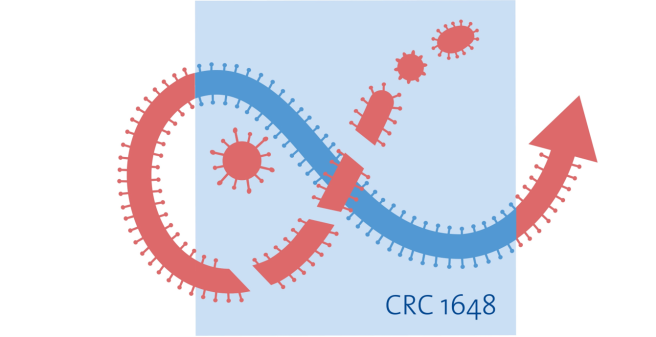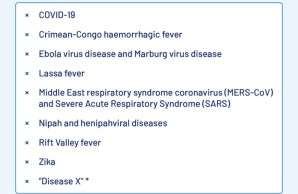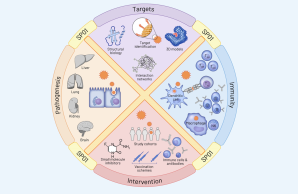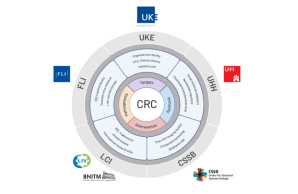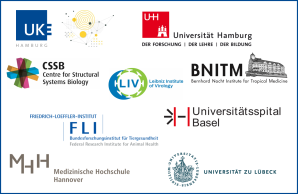Collaborative Research Centre 1648
Emerging viral infections pose a major threat to global health, as exemplified by the recent outbreaks of Ebola, MERS and Mpox, as well as the COVID-19 pandemic. These threats arise from the large number of potentially pathogenic viruses found in animal reservoirs and the associated potential for these viruses to jump to humans in spillover events. The initial lack of human-specific immunity to these viruses, the lack of antiviral treatment options, insufficient knowledge of replication, tropism, and host and viral structural targets, and the potential for rapid spread make them a threat. In preparation for future outbreaks, WHO has defined a list of priority diseases associated with specific viral infections, based on their epidemic potential and the lack of preventive and therapeutic countermeasures.
The Collaborative Research Center 1648 will address knowledge gaps in four critical research areas for scientific preparedness against emerging viral infections: Pathogenesis (A), Target Characterization (B), Immunity (C), and Intervention (D). Advanced cellular, structural, computational and chemical biology techniques will be used to identify critical virus-host interactions and to understand the molecular mechanisms underlying infection processes. The consortium will dissect vital aspects of both immune defense and immune pathology, addressing open research questions in vaccine design that can be translated to other emerging viruses and inform research and clinical strategy for intervention against future outbreaks.
This research consortium brings together a multidisciplinary team of 26 scientists from basic and clinical research to address the major challenge posed by emerging viruses through 16 research projects, one service project, and one outreach project.All PhD and MD students are automatically enrolled in the Integrated Research Training Group (iRTG). The goal of the iRTG is to train future leaders in the global fight against potential pandemics.
A particular strength of the collaborative initiative is how it synergizes and integrates the full spectrum of research approaches in specific emerging viral infections, structural biology and biophysical characterization of biomolecules and their interactions, immune defense mechanisms underlying inflammation and immunopathology, and early drug discovery and vaccine research. Molecular resources, workflows and innovative animal models will be established, resulting in a comprehensive technology toolkit for rapid application to a future "Disease X" (defined by the WHO as caused by an unknown pathogen with epidemic potential). By addressing one of the most critical research challenges of our time, this novel pipeline approach will ensure a rapid and strategic response to an emerging viral threat.
Press release
Participating Institutions
University Medical Center Hamburg-Eppendorf (UKE)
Bernhard Nocht Institute for Tropical Medicine
Centre for Structural Systems Biology
Integrated Research Training Group “Understanding emerging and re-emerging viruses”
All PhD and MD students are automatically enrolled in the Integrated Research Training Group (iRTG) "Understanding Emerging and Re-emerging Viruses".
The iRTG is closely aligned with the focus of the CRC "Emerging Viruses" and trains M.D. and Ph.D. students as future experts in emerging viral diseases. This multidisciplinary program, in collaboration with other graduate programs on campus, includes specialized training, joint lectures, and international symposia. Students gain essential skills for independent infection research, with hands-on courses in handling and working with BSL2-4 pathogens. The program emphasizes inclusivity, interdisciplinary exchange, and international networking, particularly with African partner sites.
MD positions
The CRC 1648 offers several scholarships per year for an experimental medical doctoral thesis at the participating institutions.
We are looking forward to applications from individuals with:
- A high motivation and a strong interest in the combination of structural biology, immunology and virology
- Conscientiousness, a structured working approach and a strong work ethic
- Commitment, team spirit and good communication skills, independence and flexibility
- Very good spoken and written English
- Laboratory experience would be desirable
Start: Flexible by arrangement. The work requires two semesters off/one research year. A scholarship will be paid for this period.
We look forward to receiving your application with CV and short letter of motivation to
[email protected]
